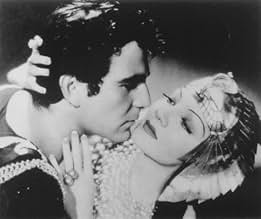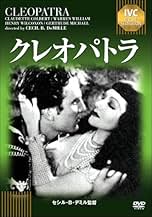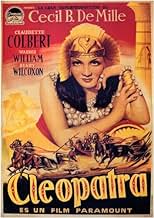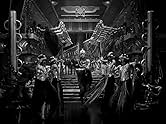IMDb RATING
6.8/10
5K
YOUR RATING
The man-hungry Queen of Egypt leads Julius Caesar and Marc Antony astray, amid scenes of DeMillean splendor.The man-hungry Queen of Egypt leads Julius Caesar and Marc Antony astray, amid scenes of DeMillean splendor.The man-hungry Queen of Egypt leads Julius Caesar and Marc Antony astray, amid scenes of DeMillean splendor.
- Won 1 Oscar
- 2 wins & 4 nominations total
Ian Maclaren
- Cassius
- (as Ian MacLaren)
Ferdinand Gottschalk
- Glabrio
- (scenes deleted)
Jayne Regan
- Lady Vesta
- (as Jane Regan)
Featured reviews
Since I am a fan of epics, particularly ancient and medieval ones, I had been looking for this movie for a long time. The name of Cecil B DeMille is probably most associated with his magnificent remake of THE TEN COMMANDMENTS (1956) where he made a total use of his imagination, where, as one of the movie critics said, "lavish sets and grandeur reach its peak." There are also people who love his silent THE KING OF KINGS (1927). DeMille's films do not seem much dated. With these expectations, I bought CLEOPATRA (1934), sat in my chair on one of the frosty evenings and started to watch. The movie involved me so much that after 20 minutes, I had to see it at least to the half, at the half, I admit an undeniable need for seeing it till the end.
The story of Cleopatra has been put on screen several times. From Helen Gardner in 1912, Theda Bara in 1917 (presumed lost) to Claudette Colbert here. The impersonation of Cleopatra was later followed by the great performances of Vivien Leigh in CAESAR AND CLEOPATRA (1945) and, of course, Liz Taylor in ultra long CLEOPATRA by Joseph L Mankiewicz, which had been the only Cleopatra film I had seen before this one. From the very beginning of watching DeMille's film, I was astonished by significant virtues of this high camp production, but realized fully that this film cannot be compared to any other film about Cleopatra.
HUMOR: Maybe this point will seem strange to mention at first, but what mostly struck me in this film was how excellent combination of history and humor it is. The script is full of very amusing contexts that lead a viewer to a wonderful atmosphere. "Together we could conquer the world," says Cleopatra to Caesar on one moonlit night, to which the Roman leader replies: "Nice of you to include me!" "I am dressed to allure you, Antony," says Cleopatra to her new Roman lover. Or after the moment when the half naked girls dance at the ox, Cleopatra says to Mark: "I wish you could see your face now. I'd have more chance with a stone wall." I know that some of these may seem dated, but they make a perfect sense in the scenes alone.
GREAT CAST: Claudette Colbert, though better known for playing in comedies, impersonated two historical figures on screen twice at DeMille's: Poppaea and Cleopatra. While her Roman empress was an object of lust and desire, her queen of the Nile is full of elegance and magnificence. In all these sophisticated fabulous costumes and gowns, she plays Cleopatra so well that she should have won an Oscar for this role. Unfortunately, Cleopatra lost to Ellie Andrews in IT HAPPENED ONE NIGHT. The other great star of the film is Henry Wilcoxon who plays Mark Antony. He gives a marvelous, one of the best performances ever seen in historical epics. Pride, irony, love, and honor are presented by him so memorably that you will never forget this performance. I dare claim that he is a better Antony than Richard Burton in CLEOPATRA (1963). The third star of the film, in my opinion, is not Warren William as Caesar, but C.Aubrey Smith as a Roman soldier Enobarbus. I saw him in several roles, including DeMille's THE CRUSADES (1935), but here, he does an extraordinary job combining his role with honor, pride and wit. However, feminists... be careful! There are slogans said by Enobarbus that are unacceptable! Ian Keith, a mainstay of historical epics, does not give a very remarkable performance as Octavian. He is not bad; however, most historians imagine Octavian differently. Warren William is not bad as Caesar but indeed not the best.
SPECTACULAR MOMENTS: The whole movie is filled with DeMillean splendor. Scene by scene leaves a gorgeous experience for the fans of lavish sets. But three scenes are a must see: first, the royal barge which is elegantly setting off when Cleopatra and Antony are making love (flower petals, dancing girls, enormous sets); second, the gowns and art direction when Cleopatra awaits Caesar on the day of his tragic death (every movement she makes in a gorgeous gown is worth admiration); third, the final shot, one of the most memorable death scenes in cinema ever (this one is hard to describe, it must be seen)! Moreover, Cleopatra's entrance to Rome, which was the moment that the movie with Liz Taylor boasted so much, is more natural in DeMille's. Here, we get the most realistic picture of Roman streets instead of a huge Sphynx statue and rather a parade than an entrance.
HISTORY: The movie is not a very good historical lesson. In this respect, Liz Taylor version supplies you with more knowledge of history. Nevertheless, we all must take into account two aspects: the period the film was made in (the 1930s required more of entertainment than of facts) and by whom it was made. It was Cecil B DeMille, a spectacle lover of crowds, gowns, peacocks, leopards, and lavish sets (late Zygmunt Kaluzynski, a Polish movie critic, once joked that when DeMille was making THE KING OF KINGS, others feared that he would entail 24 Apostles because 12 is not spectacular enough). Therefore, it is important to watch this film as a part of Cecil DeMille.
All in all, it is absolutely right to say that it is not TEN COMMANDMENTS, KING OF KINGS, or SIGN OF THE CROSS that define DeMille most. These are absolutely gorgeous films in all respect. However, the film that gives the picture of his soul and talent is CLEOPATRA. It is, however, not only an unforgettable experience of DeMille's fans, but for all fans of historical epics, Hollywood elite of the 1930s, and love stories. It is simply a must see and a must release on DVD! Though more than 70 years old, some films never fade... it is, undeniably, CLEOPATRA. 9/10
The story of Cleopatra has been put on screen several times. From Helen Gardner in 1912, Theda Bara in 1917 (presumed lost) to Claudette Colbert here. The impersonation of Cleopatra was later followed by the great performances of Vivien Leigh in CAESAR AND CLEOPATRA (1945) and, of course, Liz Taylor in ultra long CLEOPATRA by Joseph L Mankiewicz, which had been the only Cleopatra film I had seen before this one. From the very beginning of watching DeMille's film, I was astonished by significant virtues of this high camp production, but realized fully that this film cannot be compared to any other film about Cleopatra.
HUMOR: Maybe this point will seem strange to mention at first, but what mostly struck me in this film was how excellent combination of history and humor it is. The script is full of very amusing contexts that lead a viewer to a wonderful atmosphere. "Together we could conquer the world," says Cleopatra to Caesar on one moonlit night, to which the Roman leader replies: "Nice of you to include me!" "I am dressed to allure you, Antony," says Cleopatra to her new Roman lover. Or after the moment when the half naked girls dance at the ox, Cleopatra says to Mark: "I wish you could see your face now. I'd have more chance with a stone wall." I know that some of these may seem dated, but they make a perfect sense in the scenes alone.
GREAT CAST: Claudette Colbert, though better known for playing in comedies, impersonated two historical figures on screen twice at DeMille's: Poppaea and Cleopatra. While her Roman empress was an object of lust and desire, her queen of the Nile is full of elegance and magnificence. In all these sophisticated fabulous costumes and gowns, she plays Cleopatra so well that she should have won an Oscar for this role. Unfortunately, Cleopatra lost to Ellie Andrews in IT HAPPENED ONE NIGHT. The other great star of the film is Henry Wilcoxon who plays Mark Antony. He gives a marvelous, one of the best performances ever seen in historical epics. Pride, irony, love, and honor are presented by him so memorably that you will never forget this performance. I dare claim that he is a better Antony than Richard Burton in CLEOPATRA (1963). The third star of the film, in my opinion, is not Warren William as Caesar, but C.Aubrey Smith as a Roman soldier Enobarbus. I saw him in several roles, including DeMille's THE CRUSADES (1935), but here, he does an extraordinary job combining his role with honor, pride and wit. However, feminists... be careful! There are slogans said by Enobarbus that are unacceptable! Ian Keith, a mainstay of historical epics, does not give a very remarkable performance as Octavian. He is not bad; however, most historians imagine Octavian differently. Warren William is not bad as Caesar but indeed not the best.
SPECTACULAR MOMENTS: The whole movie is filled with DeMillean splendor. Scene by scene leaves a gorgeous experience for the fans of lavish sets. But three scenes are a must see: first, the royal barge which is elegantly setting off when Cleopatra and Antony are making love (flower petals, dancing girls, enormous sets); second, the gowns and art direction when Cleopatra awaits Caesar on the day of his tragic death (every movement she makes in a gorgeous gown is worth admiration); third, the final shot, one of the most memorable death scenes in cinema ever (this one is hard to describe, it must be seen)! Moreover, Cleopatra's entrance to Rome, which was the moment that the movie with Liz Taylor boasted so much, is more natural in DeMille's. Here, we get the most realistic picture of Roman streets instead of a huge Sphynx statue and rather a parade than an entrance.
HISTORY: The movie is not a very good historical lesson. In this respect, Liz Taylor version supplies you with more knowledge of history. Nevertheless, we all must take into account two aspects: the period the film was made in (the 1930s required more of entertainment than of facts) and by whom it was made. It was Cecil B DeMille, a spectacle lover of crowds, gowns, peacocks, leopards, and lavish sets (late Zygmunt Kaluzynski, a Polish movie critic, once joked that when DeMille was making THE KING OF KINGS, others feared that he would entail 24 Apostles because 12 is not spectacular enough). Therefore, it is important to watch this film as a part of Cecil DeMille.
All in all, it is absolutely right to say that it is not TEN COMMANDMENTS, KING OF KINGS, or SIGN OF THE CROSS that define DeMille most. These are absolutely gorgeous films in all respect. However, the film that gives the picture of his soul and talent is CLEOPATRA. It is, however, not only an unforgettable experience of DeMille's fans, but for all fans of historical epics, Hollywood elite of the 1930s, and love stories. It is simply a must see and a must release on DVD! Though more than 70 years old, some films never fade... it is, undeniably, CLEOPATRA. 9/10
Spectacular DeMille hokum that, like most of his work, is hard to dislike despite its flaws. Say what you will about Cecil B. DeMille but he knew how to put on a show. The sets, costumes, and pageantry are excellent. The actors are all very enjoyable even if they ham it up some. Claudette Colbert is sexy and a treat to watch. Warren William's Julius Caesar seems like he would be more at home shooting craps or hustling pool than ruling Rome. Henry Wilcoxon is quite good as Marc Antony. The rest of the cast is solid, as DeMille supporting casts usually were. I have no sympathy for history buffs who gripe about this movie's failure to adhere to historical accuracy. If you watched a movie, especially a C.B. DeMille movie, looking for a history lesson then the fault is on you and not him. It's a fun piece of escapism loosely based on real people and events. Lighten up and enjoy the movie.
I wasn't looking forward to this one as much as THE SIGN OF THE CROSS (considered by many as De Mille's best film) but I must say that I was just as impressed by it. The pacing here is smoother, and we do get to see some wonderful action montages towards the end as opposed to the rather middling arena stuff of CROSS.
Claudette Colbert, too gets a lot more coverage this time around and certainly clinches the title role far better than the positively annoying Elizabeth Taylor in the ill-fated 1963 version. However, the male leads here are less interesting, for lack of a better word: Henry Wilcoxon and Warren William are adequate but, naturally, no match for the thespian skills of Richard Burton and Rex Harrison respectively.
The supporting cast is notable (Ian Keith, Irving Pichel, Joseph Schildkraut, C. Aubrey Smith) and the film features a number of great scenes: Caesar's murder (partly filmed in a POV shot), following which is a delicious jibe at Antony's famous oratory during Caesar's funeral as envisioned by Shakespeare; the long - and justly celebrated - barge sequence, in which Antony (intent on teaching Cleopatra, whom he blames for Caesar's death, a lesson) ends up being completely won over by her wiles; Cleopatra's own death scene is simply but most effectively filmed.
Like in THE SIGN OF THE CROSS, the film's production values are truly awe-inspiring and, in fact, Victor Milner was awarded with a well-deserved Oscar for his lush cinematography here. Needless to say, De Mille's take on Cleopatra, despite feeling hurried since it runs for less than half its length, is a more satisfying viewing experience than the stultifyingly dull, overblown and misguided (if still worthwhile and not quite as catastrophic as the history books would have it) later version.
Claudette Colbert, too gets a lot more coverage this time around and certainly clinches the title role far better than the positively annoying Elizabeth Taylor in the ill-fated 1963 version. However, the male leads here are less interesting, for lack of a better word: Henry Wilcoxon and Warren William are adequate but, naturally, no match for the thespian skills of Richard Burton and Rex Harrison respectively.
The supporting cast is notable (Ian Keith, Irving Pichel, Joseph Schildkraut, C. Aubrey Smith) and the film features a number of great scenes: Caesar's murder (partly filmed in a POV shot), following which is a delicious jibe at Antony's famous oratory during Caesar's funeral as envisioned by Shakespeare; the long - and justly celebrated - barge sequence, in which Antony (intent on teaching Cleopatra, whom he blames for Caesar's death, a lesson) ends up being completely won over by her wiles; Cleopatra's own death scene is simply but most effectively filmed.
Like in THE SIGN OF THE CROSS, the film's production values are truly awe-inspiring and, in fact, Victor Milner was awarded with a well-deserved Oscar for his lush cinematography here. Needless to say, De Mille's take on Cleopatra, despite feeling hurried since it runs for less than half its length, is a more satisfying viewing experience than the stultifyingly dull, overblown and misguided (if still worthwhile and not quite as catastrophic as the history books would have it) later version.
This movie is a typical DeMille PRODUCTION, with all the strengths-gorgeous sets, costumes and a sort of grandeur to all the proceedings-as well as the weaknesses-the lavishness often comes at the expense of things like the story, acting and plot. There's no question that it's beautiful (although, interestingly enough, none of it's five nominations for Academy Awards was for Interior Decoration.) Claudette Colbert does a wnderful job, but most of the other peformances are only average at best. 1934 was a particularly good year for Colbert, who won an Academy Award for It Happened One Night and starred in at least two other major productions that year-Imitation of Life and this movie. The picture feels a bit dated, but, while far from perfect, I think it superior to the 1963 remake in a great many respects and it's well worth watching.
Was Demille more daring than any other director or was he just clueless? What does one say when the curtains close on Antony and Cleopatra and suddenly the screen erupts with more sexual symbols than any moment in Hollywood's history? From the phallic symbols (oars) to the yonic symbols (curtains) until finally both orgasmically mesh together in a final combination (a drummer with his drum), the scene tells us we're viewing the artistry of a kinky genius or a shameless carney.
And along with the jawdropping visuals, the film is crammed with juicy Demille-like dialog. Unlike other Demille films, this one has a wonderful cast to deliver his unique oneliners, and there are so many. My own favorites are the moments of dumbdowned Shakespeare. Instead of speaking of Cleopatra's "infinite variety" we are told she is always "many colored" and, of course, instead of "Et tu, Brute?" we get, "You? You too, Brutus?" What can you say about a movie in which Julius Ceasar says "Nope" to his senators? Nothing. One can only savor every delicious moment of camp that only a Demille could serve up.
The Taylor/Burton version is more spectacular, more intelligent, and more historical, but for those who relish kitsch--and this story always lends itself to it--this version is the best.
And along with the jawdropping visuals, the film is crammed with juicy Demille-like dialog. Unlike other Demille films, this one has a wonderful cast to deliver his unique oneliners, and there are so many. My own favorites are the moments of dumbdowned Shakespeare. Instead of speaking of Cleopatra's "infinite variety" we are told she is always "many colored" and, of course, instead of "Et tu, Brute?" we get, "You? You too, Brutus?" What can you say about a movie in which Julius Ceasar says "Nope" to his senators? Nothing. One can only savor every delicious moment of camp that only a Demille could serve up.
The Taylor/Burton version is more spectacular, more intelligent, and more historical, but for those who relish kitsch--and this story always lends itself to it--this version is the best.
Did you know
- TriviaWhen Cecil B. DeMille was in pre-production on this film, he asked to screen the original La Reine des Césars (1917) with Theda Bara. No prints could be found in Los Angeles, so a copy was borrowed from the Fox office in New York. After DeMille viewed the film, it was sent back to Little Ferry, NJ. On 7/9/37 a fire at the storage facility destroyed almost all of Fox's known archived prints, most likely including "Cleopatra". The screening for DeMille's company, on 2/15/34, may have been the last time anyone saw the legendary film. However, on September 14, 2023, 42 seconds of extremely rare footage of the final act in which Cleopatra prepares to die as the Roman Legion marches upon her palace was procured from a 1920's toy film projector and presented on YouTube.
- GoofsThe main doors to Cleopatra's chambers have modern metal hinges.
- Quotes
Cleopatra: Together we could conquer the world.
Julius Caesar: Nice of you to include me.
- Alternate versionsThe movie was released in Germany with German direction by Kurt Bleines and German dialogue by Helmut Brandis and Helena von Fortenbach.
- ConnectionsEdited into Spisok korabley (2008)
Details
- Runtime1 hour 40 minutes
- Color
- Aspect ratio
- 1.37 : 1
Contribute to this page
Suggest an edit or add missing content








































